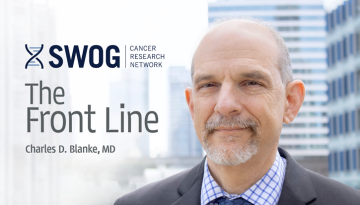Doing ASCO 2024, SWOG Style
ASCO "season" is one of my favorites, not only because it gives me an excuse to return to one of my favorite cities. The annual meeting of the American Society of Clinical Oncology, typically in Chicago the first week of June, is chock full of exciting results in clinical and translational cancer research, including many presentations based on work done by SWOG.
This year, we have 30 abstracts (seven oral, 23 posters) featuring projects led or co-led by SWOG. The full list is here and also includes abstracts we did not lead but which feature SWOG collaborators. A calendar of SWOG-led oral and poster presentations is also available.
Below, I highlight some of the oral presentations SWOG researchers will deliver in Chicago. You will want to check out our ASCO round-up press release to learn more about these key findings.
- Dr. Kevin Kalinsky, study chair of the S1007 RxPONDER trial, presents a secondary analysis from that trial. RxPONDER found that for women with hormone receptor-positive (HR+), HER2-negative breast cancer who had a 21-gene Recurrence Score of 25 or lower and 1 – 3 involved lymph nodes, menopausal status predicted whether they were likely to benefit from adjuvant chemotherapy: premenopausal women benefited, postmenopausal women did not. At ASCO 2024, Dr. Kalinsky presents results suggesting that, for RxPONDER patients younger than 55, baseline blood level of anti-Müllerian hormone may be even better than menopausal status as a predictor of chemo benefit. Abstract 505: Session: Breast Cancer – Local/Regional/Adjuvant
Monday, June 3, 4:24 – 4:36 pm, CT, Hall B1 (full session runs 3:00 – 6:00 pm)
- Dr. Lajos Pusztai, chair of our breast cancer committee, will present a new prognostic tool. An earlier tool, RSClin, combined clinical and pathologic factors with information from a patient’s 21-gene Recurrence Score assay to estimate recurrence risk and predict benefit from adjuvant chemotherapy for premenopausal or postmenopausal patients who have HR+, HER2-negative, node-negative breast cancer. Dr. Pusztai and his team have gone one better, developing a complementary tool, RSClin N+, that can do the same but for patients in this disease setting who also have 1-3 involved lymph nodes. Abstract 508: Session: Breast Cancer – Local/Regional/Adjuvant
Monday, June 3, 5:24 – 5:36 pm, CT, Hall B1 (full session runs 3:00 – 6:00 pm)
- S1600 study chair Dr. Jill Hamilton-Reeves delivers primary results from that trial. It tested whether a specialized immune-nutrition intervention could reduce the rate of complications after bladder removal surgery in patients with bladder carcinoma. The study data did not show an improvement in this primary endpoint, but early progression-free and overall survival data show a between-arm difference, although it’s not yet reached the level of statistical significance. Abstract 4501: Session: Genitourinary Cancer – Kidney & Bladder
Monday, June 3, 8:00 – 8:12 am, CT, Hall B1 (full session runs 8:00 – 11:00 am)
- Dr. Joseph Unger led a team that analyzed data on more than 100,000 adverse events experienced by more than 8,000 patients who had enrolled to 18 SWOG clinical trials in nine cancers. He’ll report at ASCO next week that baseline patient-reported fatigue was highly predictive of a patient’s risk of adverse events during subsequent treatment, with the risk of severe, life-threatening, or fatal adverse events increasing as the level of fatigue increased. Abstract 11015: Session: Quality Care / Health Services Research
Monday, June 3, 2:15 – 2:21 pm, CT, S102 (full session runs 1:15 – 2:45 pm)
- Dr. Meghna S. Trivedi will present findings from the S1714 trial she chaired, a prospective cohort study to develop a model to predict a patient’s risk of developing taxane-induced peripheral neuropathy (TIPN). The study enrolled more than 1,300 patients who had received taxane-based chemotherapy. By the 24-week mark, 62 percent of these patients experienced TIPN. Trivedi’s team identified a group of factors that predict a patient’s TIPN risk. Compared to patients with none of the risk factors – those with three to five factors were almost five times as likely to suffer from TIPN. Abstract 12005: Session: Symptom Science and Palliative Care
Sunday, June 2, 9:24 – 9:36 am, CT, S100a (full session runs 8:00 – 11:00 am)
Of course, even the list of abstracts doesn’t begin to cover the full level of contribution at ASCO 2024 by SWOG researchers. For example, two of SWOG’s patient advocates will give talks at education sessions:
- The Patient Lens on Selecting and Implementing Patient-Reported Outcomes in Research and Practice
Amy R. Geschwender, PhD
Integrating Patient-Reported Outcomes and Tolerability Assessment
Friday, May 31, 2:45 pm CT, on demand | E450b (full session runs 2:45 – 4:00 pm)
- How Can Clinicians Best Engage in Shared Decision-Making With Patients and Families Around New Therapies?
Tricia Hernandez, MS
Pediatric Hodgkin Lymphoma Treatment: Paving the Way for a Standard of Care and Shared Decision-Making
Monday, June 3, 10:15 am CT, on demand | S504 (full session runs 9:45 – 11:00 am)
Can’t make it to Chicago to catch the show? We’re planning another one-hour Best of SWOG at ASCO webinar, tentatively scheduled for Wednesday, June 26, 2 pm or 3 pm ET. We’ll send an email invitation soon with a link to register for the event, but don’t wait – save the date on your calendar now. See you in my home city!
Other Recent Stories



